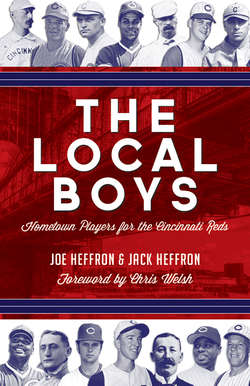Читать книгу The Local Boys - Joe Heffron - Страница 11
На сайте Литреса книга снята с продажи.
LINWOOD “KING” BAILEY
ОглавлениеNOVEMBER 1870–NOVEMBER 19, 1917
Major League Career
1895
Time as a Red
1895
Position
PITCHER
THE CONSUMMATE “CRAFTY LEFT-HANDER,” Linwood “King” Bailey posted an undefeated record for his hometown team. He pitched only one game for the Reds, on September 21, 1895, and he won it. The victory, however, didn’t earn him a contract with the team or even another chance to show what he could do.
Not much is known about his early life. According to multiple sources, he was born in Virginia in 1870, but the date and locale are unknown. We know that he was raised in Cincinnati and began playing baseball at an early age in the Bottoms section of town (roughly the riverfront up to Ft. Washington Way). Though once the gateway to the city before the Civil War, by the time Bailey lived there it had become a tough, seedy area of bars, fleabag hotels, and warehouses, captured in print by legendary journalist Lafcadio Hearn.
At the age of 20, he played his first professional ball for the Rockford (Illinois) Hustlers in the Illinois-Iowa League. That same year, he also appeared for the team in Jamestown, New York, in the New York-Pennsylvania League. He mostly rode the bench at both places and returned to Cincinnati until the following July, when he was contacted by the Macon, Georgia, team in the Southern League.
When he arrived, he was immediately made the struggling team’s starting pitcher. He won his first game 4–1, breaking Macon’s long losing streak, inspiring the fans to christen him “King.” He went on to lead the team in innings pitched that year with 382. Though a strapping six-footer, he didn’t throw especially hard, and a Sporting News article of the time noting that he had “hardly any speed.” He got by, instead, on control and deception, using what was then known as a “drop ball,” similar to what we call a sinker today. Though hardly the hurling “King” Maconians anticipated, he finished the season 22–20.
For the next couple of years, he bounced around among other minor league teams with middling success. When the 1895 Southern League season ended in September, Bailey headed home, where he ran into an old friend, Reds player-manager (and fellow local boy) Buck Ewing, who invited King to join the team for a trip to Louisville. After a great start to the season, the Reds suffered through injuries to key players; by late September, they were limping to the finish line, entrenched in ninth place in the 12-team National League, a game over .500. Louisville occupied the league’s cellar. Bailey, who was referred to as “Len” in the newspapers, agreed to tag along on the trip to Louisville, and the Enquirer felt he should be given a trial, given the team’s dearth of healthy pitchers. Though Bailey wasn’t formally under contract, Ewing asked if he wanted to pitch a game.
It was a heady offer for a 24-year-old kid used to sweating through summers in the far-less-glamorous Southern League. Bailey took the mound for the Reds, and not only did he win the game 19–8 (despite giving up 13 hits and eight runs, five earned), but he also went two for four at the plate with a double, an RBI, and a stolen base. The Enquirer reported, “There’s a few disgusted Bourbonites … for the boy from the Bottoms had a little greased lightning on the balls, which passed over the plate. He did not give up a base on balls, and only one wild pitch, due to natural nervousness from being up against a league team.” He also earned praise from his battery mate, fellow local boy Farmer Vaughn, who said he wished Bailey had joined the team sooner. In the cryptic patois of the day, Vaughn added, “The boy may be left [handed] when in-shooting balls, but he’s right on strikes.”
That game would be Bailey’s only major league appearance. He did pitch again for the Reds on a barnstorming trip through Indiana after the season, but if he had hopes of making the team in 1896, it didn’t happen. He played until 1903 for several Southern League teams, before retiring to run a pool hall in Selma, Alabama. But with baseball in his blood, he returned to coach in what was then called the Southern Association, as well as at Mercer and Sewanee universities. He was managing an insurance company in Macon when he died of blood poisoning at the age of 47. Though he played only one game for the Reds and mostly as a favor from (or maybe for) a friend, King Bailey made it count.
